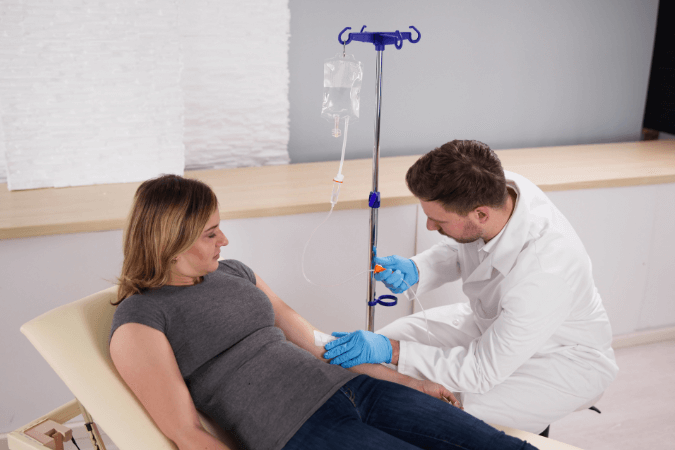
Are you struggling with Complex Post-Traumatic Stress Disorder (C-PTSD) and haven’t found relief with therapy or medications? Ketamine for complex PTSD might be the alternative treatment you’re looking for.
PTSD can develop as a result of going through or witnessing incredibly painful and stressful experiences, such as losing a loved one, physical abuse, and memories of fighting. When treating persistent types of PTSD, such as C-PTSD, it is important to understand the symptoms in order to manage the healing process. Ketamine infusion therapy appears to be more successful with comprehensive medical supervision. In this post, we’ll discuss how ketamine therapy works to alleviate C-PTSD.
What Is Complex PTSD?
Complex Post-Traumatic Stress Disorder (C-PTSD) is a psychological condition resulting from prolonged exposure to traumatic events, often involving abuse, neglect, or captivity. Unlike PTSD, which typically stems from a single traumatic incident, C-PTSD emerges from sustained trauma, causing profound and enduring emotional, cognitive, and relational difficulties.
Individuals with C-PTSD often struggle with forming and maintaining healthy relationships, experiencing disruptions in self-identity and a persistent feeling of being unsafe. Treatment typically involves therapy tailored to address the complex interplay of trauma-related symptoms and their long-term effects on the individual.
Symptoms of Complex PTSD
According to the U.S. Department of Veterans Affairs, 6% of people will suffer from PTSD at some point in their lives; women are more likely to be affected (8%) than males (4%). Difficulty focusing or sleeping, careless behavior, or sharp outbursts are usually signs of reactive symptoms that can be present in a patient with C-PTSD.
Suicidal thoughts and protracted depression are only two of the more severe symptoms that people with C-PTSD may experience. However, ketamine for complex PTSD offers those individuals a natural and safe treatment supervised by a certified healthcare provider.
Complex PTSD manifests through a variety of symptoms, including:
- Emotional Dysregulation — Individuals with C-PTSD may struggle to manage their emotions effectively, experiencing intense mood swings, uncontrollable anger, or periods of emotional numbness.
- Flashbacks and Intrusive Memories — Similar to PTSD, C-PTSD sufferers may experience vivid flashbacks or intrusive memories of past traumatic events, often triggered by reminders or similar situations.
- Dissociation — Dissociation involves a disconnection from one’s thoughts, feelings, memories, or sense of identity. Individuals with C-PTSD may experience dissociative episodes as a coping mechanism to distance themselves from overwhelming emotions or traumatic experiences.
- Persistent Feelings of Shame or Worthlessness — Prolonged exposure to trauma can lead to deep-seated feelings of shame, guilt, or worthlessness. These feelings may stem from internalized beliefs about the self or from experiences of abuse or neglect.
- Disturbances in Relationships — C-PTSD can significantly impact interpersonal relationships, leading to difficulties in forming and maintaining healthy connections. Trust issues, fear of intimacy, and patterns of avoidance or isolation are common challenges faced by those with C-PTSD.
- Alterations in Self-Perception — Individuals with C-PTSD may struggle with a distorted or fragmented sense of self. They may experience feelings of alienation from their own thoughts, emotions, or physical sensations, as well as a sense of disconnection from their own identity or personal history.
How Ketamine for Complex PTSD Works
According to some research, ketamine for complex PTSD may work better than it does to treat PTSD. When ketamine therapy is used for CPTSD patients, the outcomes are significantly better. Also, there are fewer and minimal adverse effects than for patients whose PTSD symptoms started more recently. Ketamine treatment for C-PTSD typically occurs in a specialized clinical setting under the supervision of trained professionals, often as part of a comprehensive treatment plan.
Neuroplasticity
Ketamine acts on glutamate receptors in the brain, leading to increased synaptic connectivity and promoting neuroplasticity. This can help rewire neural pathways disrupted by trauma, potentially facilitating new, healthier patterns of thinking and processing emotions.
Reduction of Depressive Symptoms
Ketamine has demonstrated rapid antidepressant effects, often within hours or days of administration. By modulating neurotransmitter activity, ketamine can alleviate symptoms of depression commonly associated with C-PTSD, providing relief from persistent feelings of sadness, hopelessness, and despair.
Interrupting Trauma Response
Ketamine may disrupt the consolidation of traumatic memories and the associated emotional response, potentially reducing the intensity of flashbacks, intrusive memories, and emotional triggers characteristic of C-PTSD.
Enhanced Therapy Response
Ketamine treatment can complement traditional psychotherapy approaches by facilitating a more receptive state for therapy sessions. Patients may experience increased openness, introspection, and emotional processing during therapy, leading to more profound therapeutic insights and progress.
Reduction of Suicidal Ideation
Ketamine’s rapid antidepressant effects have been particularly notable in reducing suicidal ideation, providing critical relief for individuals with C-PTSD who may experience intense emotional distress and thoughts of self-harm.
Reduction of Hyperarousal Symptoms
Ketamine may help mitigate symptoms of hyperarousal commonly experienced in C-PTSD, such as hypervigilance, exaggerated startle response, and difficulty relaxing. By modulating brain activity and neurotransmitter levels, ketamine can promote a calmer, more regulated state of arousal, reducing the frequency and intensity of physiological and psychological reactions to perceived threats.

Frequently Asked Questions
Is ketamine safe for treating C-PTSD?
Ketamine can be safe and effective when administered in a controlled clinical setting by trained professionals. However, like any medical intervention, it carries potential risks and side effects, which should be carefully considered and monitored by healthcare providers.
How does ketamine compare to traditional treatments for C-PTSD?
Ketamine offers a unique pharmacological approach to treating C-PTSD, with rapid-acting antidepressant effects and the potential to target symptoms resistant to conventional treatments. However, its long-term efficacy and safety compared to traditional therapies like psychotherapy and antidepressant medications are still being studied.
What are the potential side effects of ketamine treatment for C-PTSD?
Common side effects of ketamine treatment may include dissociation, dizziness, nausea, increased heart rate, and changes in blood pressure. These effects are usually transient and resolve shortly after treatment. However, individuals with certain medical conditions or psychiatric comorbidities may be at higher risk for adverse reactions and should be closely monitored.
Is ketamine treatment covered by insurance for C-PTSD?
Coverage for ketamine treatment for C-PTSD by insurance providers can vary depending on factors such as the individual’s insurance plan, the specific indication for treatment, and local healthcare policies. Patients are encouraged to consult with their insurance provider and treatment center to determine coverage options and potential out-of-pocket costs.
Conclusion
For those with C-PTSD, ketamine infusion therapy is a cutting-edge and potentially life-changing intervention. Ketamine for complex PTSD offers hope by addressing neuroplasticity and quickly reducing symptoms. To guarantee the highest level of safety, it is important to consult with a healthcare professional to review your medical history and monitor your vitals throughout the infusion.
If other therapies and medication haven’t helped you manage your C-PTSD, contact Sunshine Infusion today. We’ll be ready to discuss your specific needs and provide solutions tailored to your health goals.




